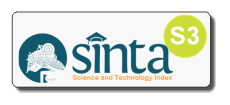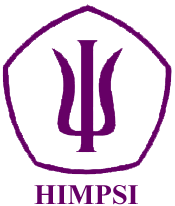The Role Of Goal Orientation and Social Support Towards Academic Help-Seeking In High School Students With Kurikulum Merdeka
Abstract
Full Text:
PDFReferences
Andrews, G., Issakidis, C., & Carter, G. (2001). Shortfall in Mental Health Service Utilisation. The British Journal of Psychiatry: The Journal of Mental Science, 179, 417–425. https://doi.org/10.1192/bjp.179.5.417
Bandura, A. (1986). Social Foundations of Thought and Action: A Social Cognitive Theory (pp. xiii, 617). Englewood Cliffs: Prentice-Hall, Inc.
Brown, D., Barry, J. A., & Todd, B. K. (2021). Barriers to Academic Help-Seeking: The Relationship With Gender-Typed Attitudes. Journal of Further and Higher Education, 45(3), 401–416. https://doi.org/10.1080/0309877X.2020.1774049
Cheng, J., Zhao, Y. Y., Wang, J., & Sun, Y. H. (2020). Academic Burnout and Depression of Chinese Medical Students in the Pre-clinical Years: The Buffering Hypothesis of Resilience and Social Support. Psychology, Health & Medicine, 25(9), 1094–1105. https://doi.org/10.1080/13548506.2019.1709651
Cheng, K.-H., & Tsai, C.-C. (2011). An Investigation of Taiwan University Students’ Perceptions of Online Academic Help-Seeking, and Their Web-Based Learning Self-Efficacy. The Internet and Higher Education, 14(3), 150–157. https://doi.org/10.1016/j.iheduc.2011.04.002
Daga, A. T. (2021). Makna Merdeka Belajar dan Penguatan Peran Guru di Sekolah Dasar. Jurnal Educatio FKIP UNMA, 7(3), 1075–1090. https://doi.org/10.31949/educatio.v7i3.1279
D’Lima, G. M., Winsler, A., & Kitsantas, A. (2014). Ethnic and Gender Differences in First-Year College Students’ Goal Orientation, Self-Efficacy, and Extrinsic and Intrinsic Motivation. The Journal of Educational Research, 107(5), 341–356. https://doi.org/10.1080/00220671.2013.823366
Effendi, R. W., & Tjahjono, E. (1999). Hubungan Perilaku Coping dan Dukungan Sosial dengan Kecemasan pada Ibu Hamil Anak Pertama. Jurnal Anima, 14(54), 214–228.
Fadillah, M., Kusumaningrum, T. A. I., & Saputri, M. (2023). Hubungan Jenis Kelamin, Pengalaman Berpacaran dan Dukungan Teman Sebaya dengan Self Efficacy Remaja untuk Tidak Melakukan Perilaku Seks Berisiko. Jurnal Kedokteran Dan Kesehatan, 19(2), 206. https://doi.org/10.24853/jkk.19.2.206-215
Fredrick, L. D., & Hummel, J. H. (2004). Reviewing the Outcomes and Principles of Effective Instruction. In D. J. Moran & R. W. Malott (Eds.), Evidence-Based Educational Methods (pp. 9–22). San Diego: Academic Press. https://doi.org/10.1016/B978-012506041-7/50003-6
Haq, A. H. B., & Alsa, A. (2015). Mathematics’ Self-Efficacy and Peer Relation as a Predictor of Mathematics Achievement. Proceeding ISETH, 282–288. Solo: Universitas Muhammadiyah Surakarta. Retrieved from https://proceedings.ums.ac.id/index.php/iseth/article/view/2402
Hattie, J. A. C., & Donoghue, G. M. (2016). Learning Strategies: A Synthesis and Conceptual Model. Npj Science of Learning, 1(1), 1–13. https://doi.org/10.1038/npjscilearn.2016.13
Kain, J. (2010). The Influence of Goal Orientation on Karasek’s (1979) Job Demands-Control Model (Doctoral dissertation). Bowling Green State University, Bowling Green. Retrieved from https://scholarworks.bgsu.edu/psychology_diss/122
Keputusan Menteri No. 56/M/2022 tentang Pedoman Penerapan Kurikulum dalam Rangka Pemulihan Pembelajaran. (2022). JDIH Kementerian Pendidikan, Kebudayaan, Riset, dan Teknologi. Retrieved from https://jdih.kemdikbud.go.id/detail_peraturan?main=3022
Kessels, U., & Steinmayr, R. (2013). Macho-Man in School: Toward the Role of Gender Role Self-Concepts and Help Seeking in School Performance. Learning and Individual Differences, 23, 234–240. https://doi.org/10.1016/j.lindif.2012.09.013
Kurikulum Merdeka Jadi Jawaban untuk Atasi Krisis Pembelajaran. (2022, February 11). Kementerian Pendidikan, Kebudayaan, Riset, dan Teknologi. Retrieved from https://www.kemdikbud.go.id/main/blog/2022/02/kurikulum-merdeka-jadi-jawaban-untuk-atasi-krisis-pembelajaran
Mahesa, M. F. (2013). Hubungan Antara Goal Orientation dengan Student Engagement pada Siswa Sekolah Masjid Terminal (Bachelor’s thesis). Universitas Indonesia, Depok. Retrieved from https://lib.ui.ac.id/m/detail.jsp?id=20347378&lokasi=lokal
Mulyana, E., Mujidin, M., & Bashori, K. (2015). Peran Motivasi Belajar, Self-Efficacy, dan Dukungan Sosial Keluarga Terhadap Self-Regulated Learning pada Siswa. PSIKOPEDAGOGIA: Jurnal Bimbingan Dan Konseling, 4(2), 165–173. https://doi.org/10.12928/psikopedagogia.v4i2.4480
Nagai, S. (2015). Predictors of Help-Seeking Behavior: Distinction Between Help-Seeking Intentions and Help-Seeking Behavior. Japanese Psychological Research, 57(4), 313–322. https://doi.org/10.1111/jpr.12091
Nopirda, Y., Oktivianto, O., & Dhevi, N. R. (2020). Hubungan Self Esteem dan Orientasi Masa Depan Bidang Pendidikan pada Siswa Kelas XI di Palembang. JURNAL PENDIDIKAN GLASSER, 4(2), 107–116. https://doi.org/10.32529/glasser.v4i2.721
Pajares, F., Cheong, Y. F., & Oberman, P. (2004). Psychometric Analysis of Computer Science Help-Seeking Scales. Educational and Psychological Measurement, 64(3), 496–513. https://doi.org/10.1177/0013164403258447
Papalia, R. B. (2008). A Composite Generalized Cross-Entropy Formulation in Small Samples Estimation. Econometric Reviews, 27(4–6), 596–609. https://doi.org/10.1080/07474930801960469
Putri, C. P., Mayangsari, M. D., & Rusli, R. (2020). Pengaruh Stres Akademik terhadap Academic Help Seeking pada Mahasiswa Psikologi Unlam dengan Indeks Prestasi Kumulatif Rendah. Jurnal Kognisia, 1(2), 28–37. https://doi.org/10.20527/jk.v1i2.1544
Sanjaya, O. D. (2019). Hubungan Antara Dukungan Sosial Guru dengan Student Engagement pada Siswa MAN 2 Banjarnegara (Bachelor’s thesis). Universitas Negeri Semarang, Semarang. Retrieved from http://lib.unnes.ac.id/id/eprint/34813
Sarafino, E. P., & Smith, T. W. (2012). Healthy Pschology: Biopsychosocial Interactions (7th ed.). New Jersey: New Jersey: John Wiley & Sons.
Saragih, M., Silitonga, E., Sinaga, T. R., & Mislika, M. (2021). Hubungan Dukungan Keluarga dengan Motivasi Belajar Mahasiswa Selama Pandemi COVID-19. Jurnal Ilmiah Keperawatan IMELDA, 7(1), 73–77. https://doi.org/10.52943/jikeperawatan.v7i1.494
Schlusche, C., Schnaubert, L., & Bodemer, D. (2021). Perceived Social Resources Affect Help-Seeking and Academic Outcomes in the Initial Phase of Undergraduate Studies. Frontiers in Education, 6. https://doi.org/10.3389/feduc.2021.732587
Senko, C., & Tropiano, K. L. (2016). Comparing Three Models of Achievement Goals: Goal Orientations, Goal Standards, and Goal Complexes. Journal of Educational Psychology, 108(8), 1178–1192. https://doi.org/10.1037/edu0000114
Sharma, H. L., & Nasa, G. (2016). Structural Equation Model Reviewing Relationships Among Goal Orientation, Academic Self-Efficacy, Academic Help-Seeking Behaviour and Achievement. International Journal of Management (IJM), 7(1), 94–102.
Sibuea, H. Y. P. (2017). Pembaruan Sistem Pendidikan di Indonesia: Perkembangan dan Tantangan. Kajian, 22(2), 151–162. https://doi.org/10.22212/kajian.v22i2.1520
Suwangsih, E. & Tiurlina. (2006). Model Pembelajaran Matematika. Bandung: UPI Press.
Swadharma, K. G., Hadiwinarto, H., & Afriyati, V. (2018). Profil Perilaku Mencari Bantuan Akademik (Academic Help-Seeking) Ditinjau dari Masalah Belajar dan Gender pada Siswa SMP Negeri 3 Kota Bengkulu. Consilia: Jurnal Ilmiah Bimbingan dan Konseling, 1(3), 36–49. https://doi.org/10.33369/consilia.1.3.36-49
Undang-Undang Nomor 20 Tahun 2003 tentang Sistem Pendidikan Nasional. (2003). Retrieved from http://peraturan.bpk.go.id/Details/43920/uu-no-20-tahun-2003
VandeWalle, D. (1997). Development and Validation of a Work Domain Goal Orientation Instrument. Educational and Psychological Measurement, 57(6), 995–1015. https://doi.org/10.1177/0013164497057006009
Zahrina, H., & Nurtjahjanti, H. (2017). Hubungan Antara Efikasi Kerja dengan Perilaku Mencari Bantuan Kerja pada Karyawan di Universitas Muhammadiyah Purwokerto. Jurnal EMPATI, 5(4), 660–666.
DOI: http://dx.doi.org/10.17977/um023v13i12024p74-83
Refbacks
- There are currently no refbacks.
Copyright (c) 2024 Jurnal Sains Psikologi

This work is licensed under a Creative Commons Attribution 4.0 International License.
Reference Manager :
|
Aliansi:
Plagiarism Checker :
This work is licensed under a Creative Commons Attribution 4.0 International License.



1.png)








